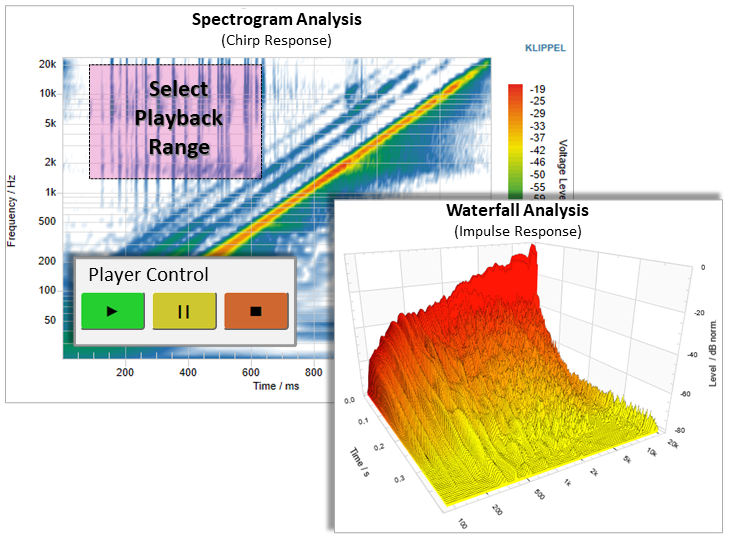Time Frequency Analysis (TFA)
Features and Benefits
The Time Frequency Analysis (TFA) is a post-processing tool that visualizes the characteristics of any audio signal over time and frequency. The processing is based on four different methods (Wavelet Transform, Short Time Fourier Transform, Cumulative Spectral Decay and Filter Bank) and can be applied to waveforms and impulse responses generated by the KLIPPEL Analyzer System or imported from audio files.
Applied to audio systems these methods provide highly valuable diagnostic information about defects (e.g. Rub&Buzz) or other abnormal behavior. Particularly when processing responses of sinusoidal test signals such as chirps, the different symptoms in audio reproduction can be identified and separated in the spectrogram. Another common application is the analysis of impulse responses to visualize the spectral decay over time that helps to identify mechanical or acoustical resonance.
For additional subjective diagnostics, the TFA integrates a dedicated player function for auralizing signal parts that can be directly selected in the spectrogram with variable playback rate.
Applications:
- Defect (Rub & Buzz) analysis and auralization
- Detecting acoustical and mechanical resonators (room modes, rocking modes)
- Visualizing signal distortion
- Signal characteristics and statistics
Analysis Methods:
- Wavelet transform
- Short-time fourier transform (STFT)
- Cumulative Spectral Decay
- Auditory filter bank
Specification
Requirements
Related Information
Other Modules of the R&D System
- Transfer Function Measurement (TRF):
Measurement of transfer function and harmonic distortion
Related Products
- Spectrogram 3D Limits (3DL):
Powerful and intuitive defect (Rub & Buzz) analysis based on auditory time/frequency (spectrogram) analysis

